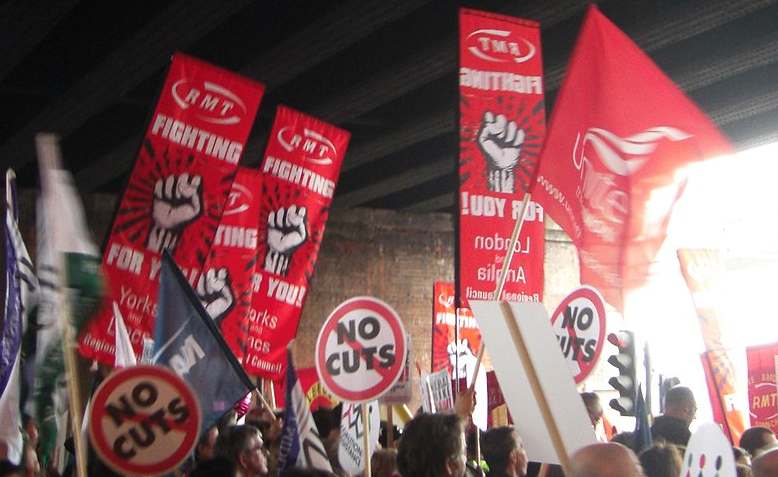 RMT banners, Photo: Midnightblueowl, Wikimedia Commons / cropped from original / licensed under CC BY-SA 3.0, linked at bottom of article
RMT banners, Photo: Midnightblueowl, Wikimedia Commons / cropped from original / licensed under CC BY-SA 3.0, linked at bottom of article
Unjum Mirza, Aslef Equalities Rep at Brixton depot reports in a personal capacity
It’s already been dubbed the “the biggest rail strike in modern history”. And that’s exactly what it’ll be as thousands of RMT rail workers, having returned a massive 9-1 vote for strike action, prepare to down-tools in a three-day national strike over redundancies and pay.
The dates set are 21, 23 and 25 June the first of which will be joined by RMT members across all grades on London Underground in a struggle over attacks on jobs, terms and conditions and pensions.
Under the guise of “modernisation”, the Employers’ and Government agenda is laid bare in a new RMT circular (rmt briefing.pdf) :
“This agenda includes thousands of jobs losses, with widespread cuts to station, catering and cleaning staff, cuts on train staff and more driver only trains and the axing of safety-critical track, engineering and operational staff”.
Andrew Haines, Network Rail’s chief executive said “We know that the cost of living has increased rise but… we are a public body and any pay increase has to be affordable for taxpayers and passengers”. Most rail workers have basic salary rates of between £25 -£30,000 around the median annual salary of £31,285 while enduring two to three year pay freezes. Andrew Haines earns a £585,000 salary. He and his mates – the top 73 Network Rail bosses – ‘earn’ a combined total of £15 million.
Transport secretary Grant Shapps is simply lying when he says the RMT action is “jumping the gun” when in fact it follows two years of discussions resulting in no assurances relating to concerns about jobs, pay and conditions. Indeed, Shapps has been fully aware of the inevitable conflict now erupting given his own anti-strike legislative considerations for a minimum staffing requirement during rail strikes based on Spain’s “essential services” clause which originated under Franco’s fascist dictatorship.
With Prime Minister Boris Johnson a dead man walking and the Tories embroiled in civil war, now is precisely the time to turn up the heat on the government. The misnomer that is the parliamentary opposition cannot and must not be relied on. Those at the sharp-end of austerity, Covid and now the cost of living crisis must move centre-stage of the struggle.
Within the rail industry itself the scope for escalation is immediately visible. Aslef hold a strike mandate on London Underground and have just returned massive votes for strike on the London Trams (99.2%); Greater Anglia (95.6%) and Hull Trains (90.3%). While co-ordinated action cannot take place for 21 June (not legally anyway), there is no reason at all that RMT and Aslef cannot strike in unity on 23 and 25 June.
And further Aslef ballots are underway on Arriva Rail London; Chiltern Railways, Great Western Railway; London North Eastern Railway; Northern Trains Ltd, Scotrail Trains ltd; SouthEastern; Transpennine Express and West Midlands Trains – all due to be declared on 11 July. The TSSA too are balloting their members across the national network.
We could be in for a hot summer of struggle. On 18 June, we need to all march together on the TUC demonstration. Come 21 June, it is our duty to mobilise and deliver the maximum solidarity for the national railway strike.
Join Revolution! May Day weekender in London
The world is changing fast. From tariffs and trade wars to the continuing genocide in Gaza to Starmer’s austerity 2.0.
Revolution! on Saturday 3 – Sunday 4 May brings together leading activists and authors to discuss the key questions of the moment and chart a strategy for the left.

